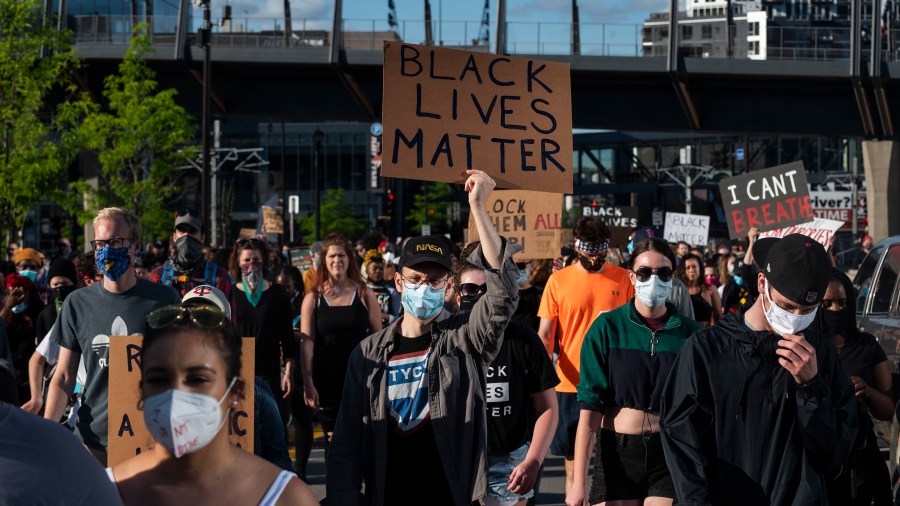How can we respond to mass protests if we can’t agree on what’s happening?

Protesters demonstrated in dozens of cities across the country over the weekend, sparked by the alleged murder of George Floyd by a Minneapolis police officer last week. But depending on where people got their news about the protests, they may have completely different ideas about what happened.
Did they “turn violent,” as many newspaper headlines suggested? Did police shoot and kick and tear gas peaceful protesters and journalists, images of which went viral on some parts of social media? Or did criminal looters indiscriminately break windows and damage businesses, as portrayed on other parts of Twitter?
More importantly, if no one gets the same story, how can we respond to the underlying issues? I spoke with Zeynep Tufekci, who studies the social impacts of technology at the University of North Carolina at Chapel Hill. The following is an edited transcript of our conversation.
Zeynep Tufekci: It’s much harder for us to come together in policy and in politics, even though if you look at the underlying sentiments in the American people, they’re not that far apart. There is broad support, for example, for police reform.
Molly Wood: You’ve written about what you termed the “power and the fragility of networked protest.” Is this the fragility part? Like, do we really need our information to be consistent at some point?
Tufekci: That is definitely the fragility part in some sense. And right now, it’s really hard to know how to exactly use social media to get that broader sense. Now, I can spend a lot of time curating my sources and I have my own ideas of what might be going on. But I’m a protest researcher. But if you’re a normal person and are coming in and out of the news cycle, you might have a very different picture, depending on what’s algorithmically amplified by a social media company, or depending on if you’ve chosen some social media sites or groups that are more sympathetic to your point of view. And then you just get more of it perhaps. And then you have no idea what to do about the conversation that needs to take place, because we’re not even sharing a narrative reality.
Wood: Is the power part, though, that despite the divergence and the splintering, is it worth it if it means that previously marginalized narratives at least have some platform?
Tufekci: Without social media, without people taking out their phone and recording those interactions, maybe we would have never heard of [these cases of police misconduct.] It’s not necessarily that the way police treat black people has changed. It’s just more people know of this now than before, partially because of social media and because of smartphones. So that’s clearly part of the picture. But even though it’s been so many years since the Black Lives Matter movement has started, the reforms that you would expect to happen, they haven’t happened. That’s the fragility part. It is harder sometimes to get a common narrative around the question so that we can have these national discussions. But it is also easier to try to break out of what otherwise would have been a single gatekeeper.
Related links: More insight from Molly Wood
To Tufekci’s point about support for police reform: A poll from just this weekend, conducted by YouGov and Yahoo! News, shows a majority of people believe that white people get better treatment by police than people of color. Most respondents also said race was a major factor in George Floyd’s death in Minneapolis and that police are not usually held accountable for misconduct.
Of course, these protests also come as President Trump has launched his own attacks on social media. And Twitter on Friday obscured one of his tweets that it said was glorifying violence, by saying that looters could be shot. Facebook said it wouldn’t take any action about the tweet, which was crossposted to that platform. Although that decision has apparently caused some real dissent inside Facebook. In posts that were leaked to The Verge, one employee wrote that the contortions the company was using to explain its neutral stance were “incredibly hard to stomach.”
For what it’s worth that same YouGov poll showed 47% of respondents said they approve of Twitter flagging Trump’s tweet. Thirty-seven percent did not, and 15% weren’t sure.
Also over the weekend, the hacker group Anonymous resurfaced after about three years of silence to say that it would be targeting the Minneapolis Police Department and the police who were involved in the killing of George Floyd. The group released a video on YouTube threatening to “expose the many crimes” of the Minneapolis police. The department’s website was offline for a time on Saturday.
The future of this podcast starts with you.
Every day, the “Marketplace Tech” team demystifies the digital economy with stories that explore more than just Big Tech. We’re committed to covering topics that matter to you and the world around us, diving deep into how technology intersects with climate change, inequity, and disinformation.
As part of a nonprofit newsroom, we’re counting on listeners like you to keep this public service paywall-free and available to all.
Support “Marketplace Tech” in any amount today and become a partner in our mission.


















